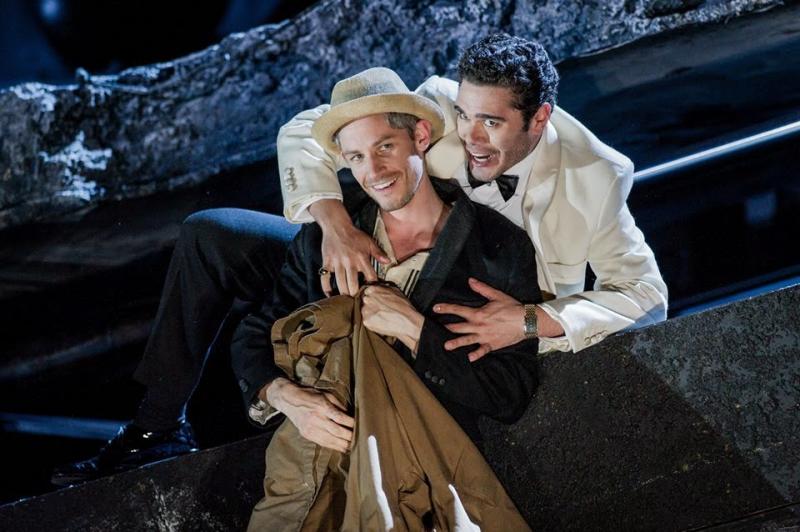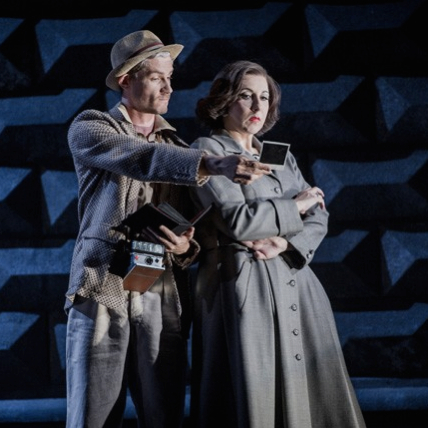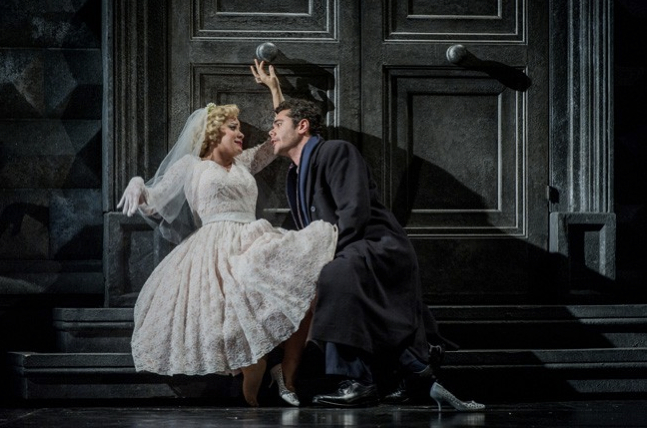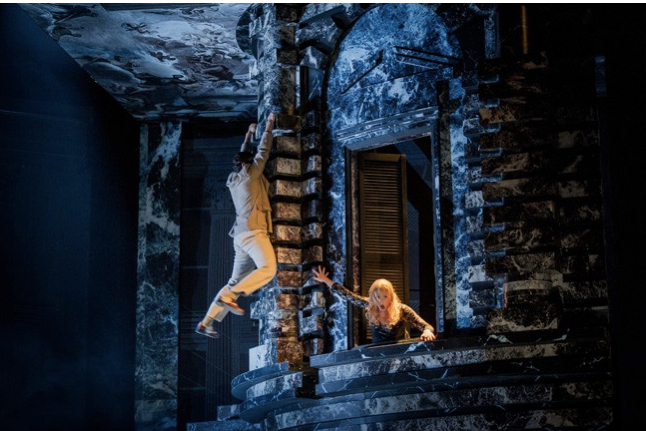Don Giovanni, Glyndebourne Festival Opera | reviews, news & interviews
Don Giovanni, Glyndebourne Festival Opera
Don Giovanni, Glyndebourne Festival Opera
Handsome new cast brings 'Godfather' Mozart to vibrant life, where premiere failed

Sex farce, class comedy, crime thriller, existential tragedy, supernatural shocker - Don Giovanni is, as Jonathan Kent notes about his production in the Glyndebourne programme, a cabinet of curiosities.
Given that the opera was intended to entertain and seduce (its plot falls to pieces in the second act), it leaves a wide-open field to make Giovanni anything from one of life’s wild delicious rebels, to philosophical sceptic, to appalling sex addict. Whatever he is, though, the audience needs to be seduced into taking leave of their sensible heads and falling headlong for him. Kent’s 2010 production, setting the opera in a Fifties Dolce Vita-meets-The Godfather Italy, flopped first time out, criticised as bland - but there's nothing bland at all about this return with a vivid new cast who play up the violence and sexual powerplay in the approach and deliver some exciting singing (the revival director is Kent's young protegé Lloyd Wood).
 By making Giovanni a reckless young mafia Don, Kent gives him an accurate setting for the clashes of sex and prudishness, law and licentiousness. Here, in a location made iconic for our own culture - Fifties fashions are so fab right now - is a parable about a male celebrity who believes in his entitlement to sex on demand beyond any form of correction, on earth or beyond.
By making Giovanni a reckless young mafia Don, Kent gives him an accurate setting for the clashes of sex and prudishness, law and licentiousness. Here, in a location made iconic for our own culture - Fifties fashions are so fab right now - is a parable about a male celebrity who believes in his entitlement to sex on demand beyond any form of correction, on earth or beyond.
It’s a stylish way to reincarnate the themes of Mozart and his librettist Lorenzo da Ponte's opera, but more than that it connects some problematic characters into a behavioural world we totally understand. Leporello here becomes the corrupt paparazzo photographer who buzzes around the gangster, feeding his myth, Polaroid camera at the ready to snap the thousands of conquests (above, Crossley-Mercer humiliating Serena Farnocchia's Elvira). It could equally be Twenties America, or modern Russia - in this perverted, pseudo-religious setting it all makes sharp sense: Anna’s aristocratic weariness with men, passionate Elvira’s middle-class insignificance, and Zerlina’s knowledge, from the bottom of the social pile, of how to fight dirty and get back at the men who own the working classes.
Designers Paul Brown and Mark Henderson realise the concept with flair and bravura, creating not just the location atmosphere but some expert coups de théâtre. Brown’s ingenious built set is a giant cube which is realistically a grand stone building until it begins revolving and unfolding. Like both zoëtrope and magic box, and animated by Henderson’s wizard lighting, it disgorges extravagant interiors and shapeshifting exteriors - a crumbling turret (with Giovanni shinning down it and almost falling off), a cathedral (Zerlina seduced on its steps as she emerges from her wedding, pictured below), Don Giovanni’s kitsch palazzo.
 Huge projections of 18th-century art - a sorrowing virgin, lusty lovers, and some startling sadistic porn - comment on the irrelevance of reason when the sexual urge is unleashed. The Catholic church is made strikingly present in Act 1 but there’s the whiff of cordite rather than sulphur in the manic disorderliness of Act 2's scenery meltdown. The Don is given a humiliating decline (his serenade in the cold street ignored, in the snow), and a dismal end, which might work on the page but it's downbeat on the stage.
Huge projections of 18th-century art - a sorrowing virgin, lusty lovers, and some startling sadistic porn - comment on the irrelevance of reason when the sexual urge is unleashed. The Catholic church is made strikingly present in Act 1 but there’s the whiff of cordite rather than sulphur in the manic disorderliness of Act 2's scenery meltdown. The Don is given a humiliating decline (his serenade in the cold street ignored, in the snow), and a dismal end, which might work on the page but it's downbeat on the stage.
Still, the attention to detail in staging the many tricky group scenes has vivid wit and also psychological perspicuity (a tense argument about rape and betrayal taking place over the Commendatore's coffin in the cathedral). One doesn't expect singers to produce such expertise in stage use and committed acting naturalism, but I suspect this new cast has been selected to provide it. The reinvention of Leporello sets the tone, with the tall French-Irish baritone Edwin Crossley-Mercer as a charmingly louche hack whose morals are as depressingly ambiguous as the Don’s. With one of three very fine baritone voices on stage, and such a winning physical lankiness, Crossley-Mercer is also an amusing comic actor whose UK debut surely heralds a lot of love from British audiences.
 Canada provides two exceptional singer-actors in Layla Claire (Anna) and Elliot Madore (Don Giovanni). Both are strikingly handsome figures on stage (and it helps - for opera is theatre, as some of my colleagues were at pains to point out in the "Dumpygate" scandal over Der Rosenkavalier). The tall, blonde Claire has a ravishing soprano voice of trumpet-like clarity with creamy tragic colourings, and she comports herself with a stillness that gives a real moral intensity to Anna's ambiguity about her boyfriend Ottavio. Madore's Don is lithe and burnished of voice, a wholly persuasive, hyperactive young Roman gangster, scuttling up walls (pictured above, with Anna) and even riding bicycles as he sings, and swiftly beating Anna’s father to death.
Canada provides two exceptional singer-actors in Layla Claire (Anna) and Elliot Madore (Don Giovanni). Both are strikingly handsome figures on stage (and it helps - for opera is theatre, as some of my colleagues were at pains to point out in the "Dumpygate" scandal over Der Rosenkavalier). The tall, blonde Claire has a ravishing soprano voice of trumpet-like clarity with creamy tragic colourings, and she comports herself with a stillness that gives a real moral intensity to Anna's ambiguity about her boyfriend Ottavio. Madore's Don is lithe and burnished of voice, a wholly persuasive, hyperactive young Roman gangster, scuttling up walls (pictured above, with Anna) and even riding bicycles as he sings, and swiftly beating Anna’s father to death.
Mozart intended a sparkling night of music theatre, and this is that, for today
Someone should be credited for coaching the uninhibited nature of the frequent lovemaking, in which Madore and Lenka Máčiková’s platinum-blonde minx of a Zerlina look exceptionally convincing. The Slovakian soubrette proves the Don's equal in appetite and cruelty: when she catches Leporello in his disguise, she relishes tying him up, sexily peeling off her stockings to taunt him - it's pure theatre (making up for the dubious musical number). She’s also a delight of a singer, her piquant soprano complementing Brandon Cedel’s rather dignified Masetto, another impressive UK debutant.
The only native Italian on stage (which shows in the enunciation) is the Elvira of Serena Farnocchia, who handles her character's loser aspect - and drab outfits - with unfailing musicality and dramatic sincerity. I thought Ben Johnson, the English tenor, was below his vocal best as Ottavio on first night - as a character he is doomed to be visibly overwhelmed by Claire’s dominant Anna, but he is given back the stage in a touching, subtle way for "Dalla sua pace" (Mozart's much better Vienna substitution for "Il mio tesoro") and the singer should rise to the occasion.
The whole is excitingly tied together musically by the LPO under the rising star, the Vienna-trained Colombian, Andrés Orozco-Estrada - treating the score with a theatrical modern immediacy and very free all-colour effect that is almost Verdian in ensembles, but also enjoying the character potential of period textures (he gives “Ah, fuggi il traditor” an unexpected baroque starchiness that instantly labels poor Elvira po-faced). It works entirely in this staging and this house. Mozart intended a sparkling night of music theatre, and this is that, for today.
- Don Giovanni is performed at Glyndebourne Opera, Sussex, on 11, 14, 18, 21 27 June, 4, 9, 13, 16, 19, 25, 29 July and 1 August
rating
Explore topics
Share this article
The future of Arts Journalism
You can stop theartsdesk.com closing!
We urgently need financing to survive. Our fundraising drive has thus far raised £49,000 but we need to reach £100,000 or we will be forced to close. Please contribute here: https://gofund.me/c3f6033d
And if you can forward this information to anyone who might assist, we’d be grateful.

Subscribe to theartsdesk.com
Thank you for continuing to read our work on theartsdesk.com. For unlimited access to every article in its entirety, including our archive of more than 15,000 pieces, we're asking for £5 per month or £40 per year. We feel it's a very good deal, and hope you do too.
To take a subscription now simply click here.
And if you're looking for that extra gift for a friend or family member, why not treat them to a theartsdesk.com gift subscription?
more Opera
 Carmen, English National Opera review - not quite dangerous
Hopes for Niamh O’Sullivan only partly fulfilled, though much good singing throughout
Carmen, English National Opera review - not quite dangerous
Hopes for Niamh O’Sullivan only partly fulfilled, though much good singing throughout
 Giustino, Linbury Theatre review - a stylish account of a slight opera
Gods, mortals and monsters do battle in Handel's charming drama
Giustino, Linbury Theatre review - a stylish account of a slight opera
Gods, mortals and monsters do battle in Handel's charming drama
 Susanna, Opera North review - hybrid staging of a Handel oratorio
Dance and signing complement outstanding singing in a story of virtue rewarded
Susanna, Opera North review - hybrid staging of a Handel oratorio
Dance and signing complement outstanding singing in a story of virtue rewarded
 Ariodante, Opéra Garnier, Paris review - a blast of Baroque beauty
A near-perfect night at the opera
Ariodante, Opéra Garnier, Paris review - a blast of Baroque beauty
A near-perfect night at the opera
 Cinderella/La Cenerentola, English National Opera review - the truth behind the tinsel
Appealing performances cut through hyperactive stagecraft
Cinderella/La Cenerentola, English National Opera review - the truth behind the tinsel
Appealing performances cut through hyperactive stagecraft
 Tosca, Royal Opera review - Ailyn Pérez steps in as the most vivid of divas
Jakub Hrůša’s multicoloured Puccini last night found a soprano to match
Tosca, Royal Opera review - Ailyn Pérez steps in as the most vivid of divas
Jakub Hrůša’s multicoloured Puccini last night found a soprano to match
 Tosca, Welsh National Opera review - a great company reduced to brilliance
The old warhorse made special by the basics
Tosca, Welsh National Opera review - a great company reduced to brilliance
The old warhorse made special by the basics
 BBC Proms: The Marriage of Figaro, Glyndebourne Festival review - merriment and menace
Strong Proms transfer for a robust and affecting show
BBC Proms: The Marriage of Figaro, Glyndebourne Festival review - merriment and menace
Strong Proms transfer for a robust and affecting show
 BBC Proms: Suor Angelica, LSO, Pappano review - earthly passion, heavenly grief
A Sister to remember blesses Puccini's convent tragedy
BBC Proms: Suor Angelica, LSO, Pappano review - earthly passion, heavenly grief
A Sister to remember blesses Puccini's convent tragedy
 Orpheus and Eurydice, Opera Queensland/SCO, Edinburgh International Festival 2025 review - dazzling, but distracting
Eye-popping acrobatics don’t always assist in Gluck’s quest for operatic truth
Orpheus and Eurydice, Opera Queensland/SCO, Edinburgh International Festival 2025 review - dazzling, but distracting
Eye-popping acrobatics don’t always assist in Gluck’s quest for operatic truth
 MARS, Irish National Opera review - silly space oddity with fun stretches
Cast, orchestra and production give Jennifer Walshe’s bold collage their all
MARS, Irish National Opera review - silly space oddity with fun stretches
Cast, orchestra and production give Jennifer Walshe’s bold collage their all
 Káťa Kabanová, Glyndebourne review - emotional concentration in a salle modulable
Janáček superbly done through or in spite of the symbolism
Káťa Kabanová, Glyndebourne review - emotional concentration in a salle modulable
Janáček superbly done through or in spite of the symbolism

Add comment